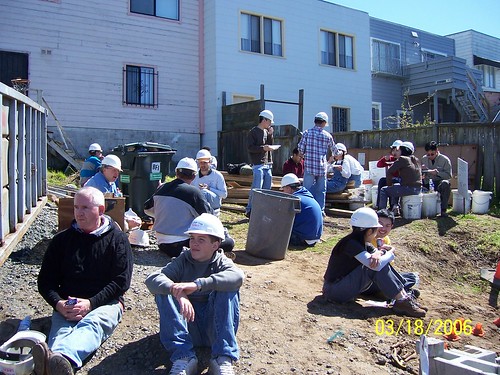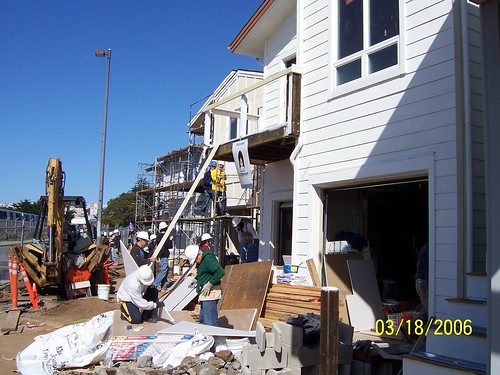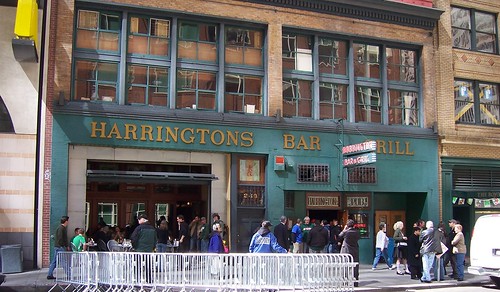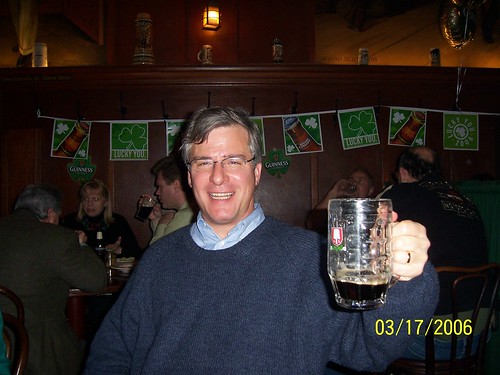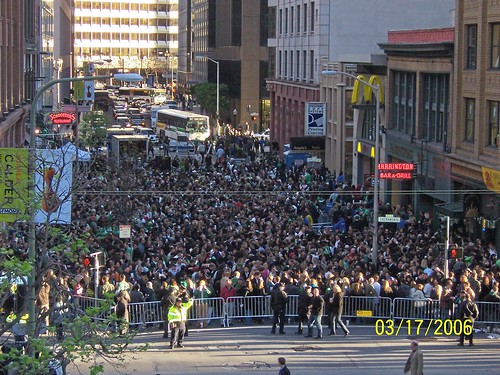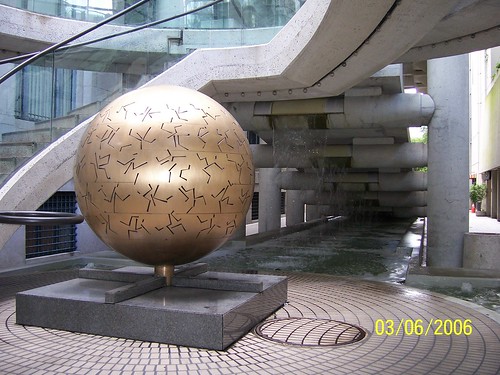Wednesday, March 29, 2006
CWS
Everyone has had to confront disappointment, but the emotion must be especially powerful for those who had spectacular success within their grasp but let slip through their fingers. In the CWS (coulda/woulda/shoulda) Hall of Fame are book publishers HarperCollins, Penguin, and Transworld, who rejected an English schoolteacher’s fanciful tales of a boy wizard who goes off to school. A second inductee is drummer Pete Best, who left a Liverpool rock band in the early 1960’s--anyone know what happened to them? A third entry is Ron Wayne, who 30 years ago decided that a company started by two computer geeks named Steve was going nowhere. Whenever you’re feeling regrets about the roads not taken, take heart that you’re not those guys.
Tuesday, March 28, 2006
Falling Mightily
Companies ought to wise up---it's a lot less expensive to retain customers than to watch them walk out the door, then wage expensive marketing campaigns to win them back. After grumpily watching the price of my Chronicle home subscription rise to nearly $200 per year, I quit. (Another reason was that every article seemed to be an op-ed piece; whether one was reading the news, arts, business, or even the sports section, one couldn't escape the Party line. But that's not the point here.)
On Sunday a neatly dressed young man stood outside our Foster City supermarket and proffered a free paper as a come-on. I listened to his pitch: an annual subscription to the Chronicle was $115, at least 30% below the price of two years ago. And I would get a $50 supermarket gift certificate that would lower the effective cost to $65, a little over a buck a week. The newstand price of the Sunday paper alone is $1.50, so--he was breaking my arm!--I signed up and took the free canvas bag.
If one disregards the free dailies--which by the way have greatly improved--the San Francisco Chronicle has the newspaper monopoly in one of America's premier cities and used to be regarded as one of America's premier papers. It's now trolling for subscribers at suburban supermarkets and practically giving it away. How the mighty have fallen.
On Sunday a neatly dressed young man stood outside our Foster City supermarket and proffered a free paper as a come-on. I listened to his pitch: an annual subscription to the Chronicle was $115, at least 30% below the price of two years ago. And I would get a $50 supermarket gift certificate that would lower the effective cost to $65, a little over a buck a week. The newstand price of the Sunday paper alone is $1.50, so--he was breaking my arm!--I signed up and took the free canvas bag.
If one disregards the free dailies--which by the way have greatly improved--the San Francisco Chronicle has the newspaper monopoly in one of America's premier cities and used to be regarded as one of America's premier papers. It's now trolling for subscribers at suburban supermarkets and practically giving it away. How the mighty have fallen.
Thursday, March 23, 2006
A Tiny Bit
The youngster sat on the curb and voiced his frustration. “I’m not doing anything useful. I’m just pulling weeds and hauling garbage.”
I’m doing that, too.
“Why can’t I help you? I want to use a hammer.”
You can’t step into the buildings because of the insurance. The insurance doesn’t allow kids to be on the site. Once some children probably got hurt, and their parents sued Habitat for Humanity for a lot of money. Habitat needs money for materials, not lawsuits.
“But I want to do something important.”
You are doing something important. Building a house is more than hammering and sawing and painting. Someone has to clean up the outside and pick up the trash. The guy who installs the balcony is no better than the guy pushing the wheelbarrow; each has given eight hours of his time. Do you think that they’re doing it for recognition?
“No.”
Are they getting any money?
“No.”
So why are they here? Why are you here?
“To build a house for people who don’t have a house….?”
Yes. You gave up your Saturday to help somebody, instead of playing games or going to the movies. I’m proud of you.
My brief sojourn into the Socratic method had reached a dead end. With young teens there’s a limit to subtlety and inductive reasoning. You have to tell ‘em, then show ‘em, then tell ‘em again and hope a tiny bit sticks. © 2006 Stephen Yuen
Wednesday, March 22, 2006
Philosophical Equanimity
I don’t want to be premature and jinx the situation, but I’m reaching a state of philosophical equanimity where the things that don’t matter really don’t matter. Last week I fielded a call from someone high on the corporate totem pole. He resented being kept out of the loop on a trivial personnel issue not involving someone in his organization. His expletive-laden diatribe indicated that the poor guy needs help; he’s been under a lot of stress this past year. I spoke soothingly, and he calmed down. By the way, he’s Irish. (Stereotyping is frowned upon, unless we’re talking about white males.)
On Saint Patrick’s Day, as she always does, Eileen baked her Irish soda bread. Eileen has learned to make it moister and sweeter than in past years, so it went quickly. Maybe it was the salt she uses, but on this particular morning neither coffee nor tea could slake my thirst. I joined Clement for a beer at noon.
We waited but couldn’t get into Harrington’s. Trying to get a table at Harrington’s on Saint Patrick’s Day is like trying to score a ticket to the Giants home opener, especially if Barry Bonds is playing.
Erin go bragh!
On Saint Patrick’s Day, as she always does, Eileen baked her Irish soda bread. Eileen has learned to make it moister and sweeter than in past years, so it went quickly. Maybe it was the salt she uses, but on this particular morning neither coffee nor tea could slake my thirst. I joined Clement for a beer at noon.
We waited but couldn’t get into Harrington’s. Trying to get a table at Harrington’s on Saint Patrick’s Day is like trying to score a ticket to the Giants home opener, especially if Barry Bonds is playing.
We ambled to Schroeder’s across the street. Just for today, Schroeder’s suspended its usual menu of sauerbraten and German sausages in favor of corned beef. Fortunately, its extensive collection of libations was available. Clement and I had a long liquid lunch, filled with plans for the future and solutions for the problems of the present. Something about these pubs seems to spark my creativity, so I resolved to frequent them more often. © 2006 Stephen Yuen
Erin go bragh!
Saturday, March 18, 2006
Blame Bush for the Weather, Unless It's Good
Three weeks ago Chronicle columnist Mark Morford dispassionately assessed the Bush Administration's stance on global warming:
Five minutes of research on Google reveals more data about calamitous shifts in climate than you can possibly absorb over your morning coffee without suffering a mad desire to strangle BushCo for shunning the Kyoto Treaty like a goddamn child shuns humanitarian broccoli.And it took just thirty seconds of research on Google to find out that Bush Administration policies are responsible for Hurricane Katrina:
Well, the science is clear. This month, a study published in the journal Nature by a renowned MIT climatologist linked the increasing prevalence of destructive hurricanes to human-induced global warming.We Californians, even some Republicans like our Governor, are more enlightened about global warming because we have more at stake, or likely we're just smarter than those guys in Washington:
Now we are all learning what it’s like to reap the whirlwind of fossil fuel dependence which [Mississippi Governor Haley] Barbour and his cronies have encouraged. Our destructive addiction has given us a catastrophic war in the Middle East and--now--Katrina is giving our nation a glimpse of the climate chaos we are bequeathing our children.
"California needs to take action because it is particularly vulnerable to global warming," said Alan Lloyd, secretary of the state's Environmental Protection Agency. He cited a study published in June by the National Academy of Sciences that predicted global warming will have dire effects on the state. The study, carried out by 19 scientists at universities and research institutions, found that by 2070, the Sierra snowpack is likely to be reduced by 29 to 89 percent, causing a reduction in the state's water supply by as much as 30 percent, having a severe impact on the state's farms and ski areas and worsening urban smog.Agriculture, recreation, air quality---all harmed by the short-sighted policies of the Administration. So, what do we make of this (on the front page of Saturday's Chronicle)?
If California suddenly went dry, and no rain or snow fell for two straight years, the state would still have enough water to go around thanks to this year's wet winter, meteorologists and water experts said Friday.I'm looking forward to reading about how George Bush is responsible for this, too. © 2006 Stephen Yuen
The recent cold snap that blanketed the Sierra with snow, and even powdered Bay Area hills, is expected to leave the state flush with water for the foreseeable future.
The Sierra Nevada snowpack, which, to hydrologists, is a better holding tank than the biggest man-made reservoirs, has more water in it than even last year.
"We're in fat city, and I mean fat city!" exclaimed Mike Pechner, staff meteorologist for KCBS Radio. "This is a superb water year." "This will probably be some of the greatest spring skiing conditions in memory," Pechner said. "There is already a deep snowpack and prospects for more snow in the first part of April."
The extra snow means that, come spring, the rivers and streams will be flowing hard, great for fish and other wildlife.
Friday, March 17, 2006
Pedestrian Week
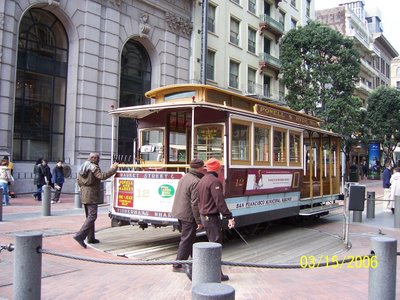 The cold, wet weather has kept the tourists away. There was only a short wait for the cable car at Powell & Market.
The cold, wet weather has kept the tourists away. There was only a short wait for the cable car at Powell & Market.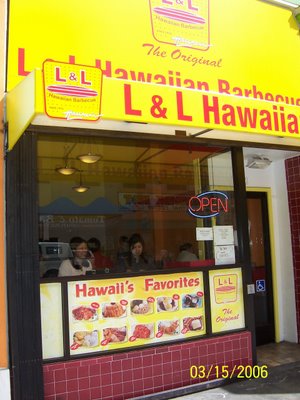
The downside of expansion is loss of cachet. Now that the Hawaiian plate lunch chain, L&L, has expanded to the mainland, I no longer feel the urge to make daily visits to their outlets when I'm in the Islands. The L&L on Kearny is a few blocks from my office, but I don't go there often for health reasons---a Hawaiian plate lunch is a calorie- and fat-laden assortment of Asian/Pacific favorites, plus macaroni salad.
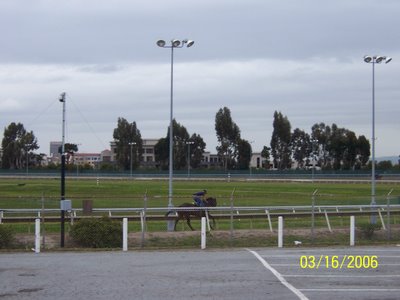
The jockeys are out every morning at the Bay Meadows race track, next to the Caltrain station at Hillsdale. They used to work out at the practice track until several years ago, when both the practice track and stables were demolished to build expensive offices, condos, and apartments that can be seen in the background.
Tuesday, March 14, 2006
Overgrown Metaphor
Plants should periodically be re-potted. Detritus and toxins accumulate and need to be flushed from the container. The roots are placed in rich clean soil, and, if a modest degree of care is taken, the shock of transplantation stimulates new growth without incurring damage. [Previous sentences inspired by Chauncey Gardener.]
And so it is that I’ve moved on to a different job with my long-time employer. No longer will I have to study reams of flowcharts that describe how payables are processed; no longer will I have to delineate the reasons why gross income and interest expense vary from the annual budget. Leave that to people with sharper eyesight and the willingness and expertise to plow through dozens of journal entries and unearth the details behind the lines on the financial statements.
Instead I will ponder whether a lease into a foreign jurisdiction triggers local taxes by creating a deemed permanent establishment. Perhaps a loan structure or asset-value guarantee will solve the problem; that depends on what the tax treaty says. (My employer pays me a decent wage to be conversant with what sounds to some like gobbledy-gook, but after a while the subject matter grows on you.) Well, we’ll soon see whether the transplant takes or whether it’s all just a bunch of fertilizer. © 2006 Stephen Yuen
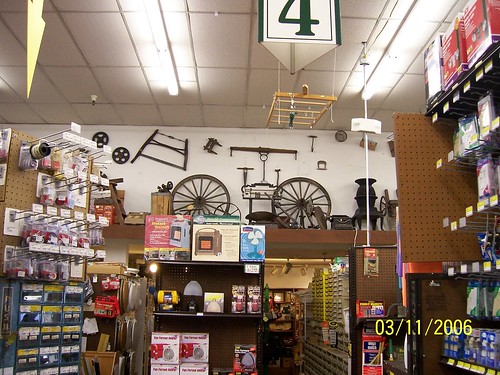
Wisnom's has been supplying hardware and garden supplies in San Mateo for a hundred years. Here one can find parts that much larger chains don't carry.
And so it is that I’ve moved on to a different job with my long-time employer. No longer will I have to study reams of flowcharts that describe how payables are processed; no longer will I have to delineate the reasons why gross income and interest expense vary from the annual budget. Leave that to people with sharper eyesight and the willingness and expertise to plow through dozens of journal entries and unearth the details behind the lines on the financial statements.
Instead I will ponder whether a lease into a foreign jurisdiction triggers local taxes by creating a deemed permanent establishment. Perhaps a loan structure or asset-value guarantee will solve the problem; that depends on what the tax treaty says. (My employer pays me a decent wage to be conversant with what sounds to some like gobbledy-gook, but after a while the subject matter grows on you.) Well, we’ll soon see whether the transplant takes or whether it’s all just a bunch of fertilizer. © 2006 Stephen Yuen

Wisnom's has been supplying hardware and garden supplies in San Mateo for a hundred years. Here one can find parts that much larger chains don't carry.
Thursday, March 09, 2006
Low Traffic
In a little-trafficked corner outside the Park Hyatt hotel sits this piece by Fritz Koenig, the sculptor whose much larger work survived the attack on the World Trade Center. The hip city is filled with places of beauty, some, like Embarcadero Center, built at great expense, while others are nature's gifts. When the true artist follows his muse, he doesn't know whether his creation will be stored in a closet or be appreciated by millions; he just does the best he can for the sake of the art. Accolades would be nice, and popularity helps pay the rent, but that's not what drives him. Fritz Koenig must have been glad that his work did not perish. © 2006 Stephen Yuen
Wednesday, March 08, 2006
Consider the Lilies
Very few Americans have so much stashed away that they can quit working. At the water cooler my co-workers chat about accumulating a magic number---in the 1980’s a CPA wrote an article that said $500,000 would be enough to produce a reasonably comfortable existence in perpetuity---but today we need at least $1,000,000 in savings on top of a paid-up house.
(This estimate applies to those who wish to retire before the age of 55, the earliest point at which one is eligible to receive an employer-paid pension. It also assumes one is not receiving Social Security, which can kick in at age 62. Retirement financial planning has often been likened to a three-legged stool: savings, pension, and Social Security. If you have all three, you don't need as much savings.)
When we were young and thought we would live forever, we worked and saved so that we could lead the good life later (the Protestant Ethic). Today we work out of fear.
Fidelity Investments says that a 65-year-old couple without an employer-paid plan needs $200,000 to cover their share of medical expenses for the rest of their lives. $200,000 may seem like a bump on the road to those with a shot at amassing $1,000,000, but it’s an awful lot to someone making $50,000 per year. Furthermore, $200,000 is just an average; we all know someone who has had to go to the hospital for an unplanned emergency, and if he was uninsured, then it was doubly calamitous. In the Bay Area the bills for major surgery easily run into six figures, and, if you’re uninsured and have modest assets, the odds are that you’ll be wiped out.
Even if one can afford it, buying insurance on one’s own is extremely frustrating, especially if one’s family has a pre-existing medical condition, such as heart disease, cancer, or diabetes. The insurance company will try to exclude coverage for these illnesses, but these conditions are what motivates the purchase of insurance in the first place.
Because of the fear of the major medical event, and because of the fear of navigating the system without the protection of an employer, people work. They may have means, advanced degrees, and decades of experience, but they hold low-level jobs that they could do in their sleep, not to pay the mortgage, but to receive health benefits.
The fear of the disruptive event---natural disaster, terrorism, medical emergency---controls more of our lives than we’re aware of, and, in this season of Lent, we should ponder these words and ask how much of them we truly believe:
(This estimate applies to those who wish to retire before the age of 55, the earliest point at which one is eligible to receive an employer-paid pension. It also assumes one is not receiving Social Security, which can kick in at age 62. Retirement financial planning has often been likened to a three-legged stool: savings, pension, and Social Security. If you have all three, you don't need as much savings.)
When we were young and thought we would live forever, we worked and saved so that we could lead the good life later (the Protestant Ethic). Today we work out of fear.
Fidelity Investments says that a 65-year-old couple without an employer-paid plan needs $200,000 to cover their share of medical expenses for the rest of their lives. $200,000 may seem like a bump on the road to those with a shot at amassing $1,000,000, but it’s an awful lot to someone making $50,000 per year. Furthermore, $200,000 is just an average; we all know someone who has had to go to the hospital for an unplanned emergency, and if he was uninsured, then it was doubly calamitous. In the Bay Area the bills for major surgery easily run into six figures, and, if you’re uninsured and have modest assets, the odds are that you’ll be wiped out.
Even if one can afford it, buying insurance on one’s own is extremely frustrating, especially if one’s family has a pre-existing medical condition, such as heart disease, cancer, or diabetes. The insurance company will try to exclude coverage for these illnesses, but these conditions are what motivates the purchase of insurance in the first place.
Because of the fear of the major medical event, and because of the fear of navigating the system without the protection of an employer, people work. They may have means, advanced degrees, and decades of experience, but they hold low-level jobs that they could do in their sleep, not to pay the mortgage, but to receive health benefits.
The fear of the disruptive event---natural disaster, terrorism, medical emergency---controls more of our lives than we’re aware of, and, in this season of Lent, we should ponder these words and ask how much of them we truly believe:
Be not anxious about your life, what you shall eat, or what you shall drink, nor about your body, what you shall put on. Is not life more than food, and the body more than clothing?© 2006 Stephen Yuen
For the Gentiles seek all these things; and your heavenly Father knows that you need them all. But seek first his kingdom and his righteousness, and all these things shall be yours as well.
[Matt 6: 25, 32, 33]
Sunday, March 05, 2006
Remember That You Are Dust
On January 1st we rang in the New Year, and on January 29th Asian cultures ushered in the lunar Year of the Dog, but for many Christians the year began spiritually on March 1st with Ash Wednesday, the first day of Lent. In the land of plenty, we need Lent more than ever.
Lent commemorates Jesus’ 40 days of testing in the wilderness, where he decided not to stray from the lonely path that culminated in his crucifixion. Lent is a time for self-examination and repentance, for prayer, fasting, and self-denial, for reading and meditating. Lent is a time to ponder a simple list of almost quaint-sounding words: pride, greed, envy, lust, anger, sloth, and gluttony. (I have a great deal of trouble with at least four---how are you doing, dear reader?)
Modern affluence allows us to sate nearly every appetite. Most Americans live free from hunger, crippling disease, and premature death. But 21st century man craves even more. Our minds need to be perpetually entertained, an eighth sin that the ancients would have listed if they had round-the-clock cable with 500 channels. Universal wi-fi, blackberries and cell-phones, and portable audio, video, and game players have banished boredom forever. Stimulation is available 24/7; life has become Las Vegas.
But man’s physiology has not changed. We are still susceptible to the weaknesses of the flesh and the seven deadly sins. And....we are mortal. It’s just that we don’t have to think about our mortality very much, as modernity overwhelms the senses. That’s why the priest imposes the ashes and intones:
Lent commemorates Jesus’ 40 days of testing in the wilderness, where he decided not to stray from the lonely path that culminated in his crucifixion. Lent is a time for self-examination and repentance, for prayer, fasting, and self-denial, for reading and meditating. Lent is a time to ponder a simple list of almost quaint-sounding words: pride, greed, envy, lust, anger, sloth, and gluttony. (I have a great deal of trouble with at least four---how are you doing, dear reader?)
Modern affluence allows us to sate nearly every appetite. Most Americans live free from hunger, crippling disease, and premature death. But 21st century man craves even more. Our minds need to be perpetually entertained, an eighth sin that the ancients would have listed if they had round-the-clock cable with 500 channels. Universal wi-fi, blackberries and cell-phones, and portable audio, video, and game players have banished boredom forever. Stimulation is available 24/7; life has become Las Vegas.
But man’s physiology has not changed. We are still susceptible to the weaknesses of the flesh and the seven deadly sins. And....we are mortal. It’s just that we don’t have to think about our mortality very much, as modernity overwhelms the senses. That’s why the priest imposes the ashes and intones:
Remember that you are dust, and to dust you shall return.© 2006 Stephen Yuen
Subscribe to:
Posts (Atom)
